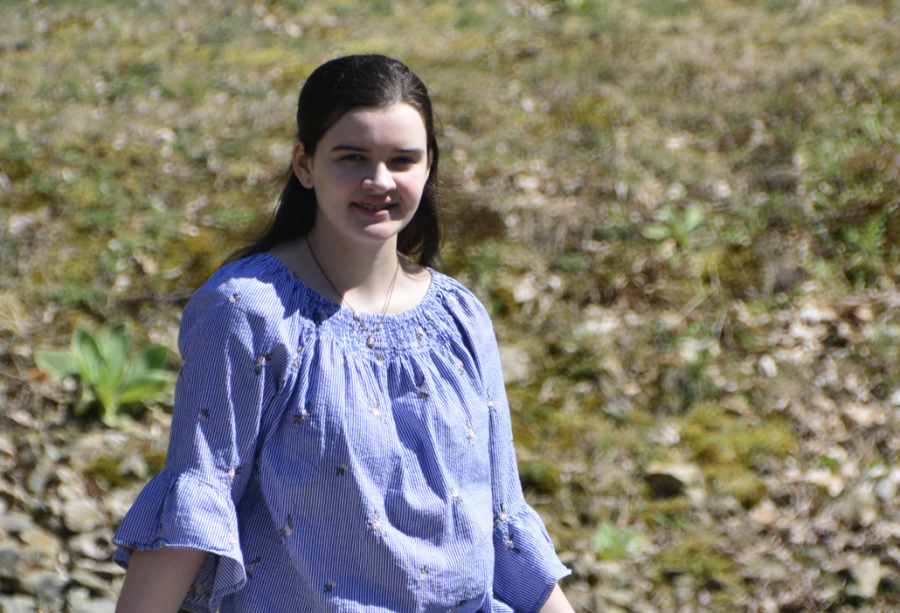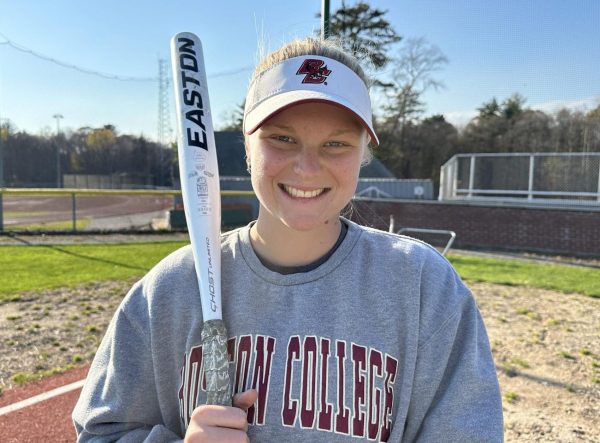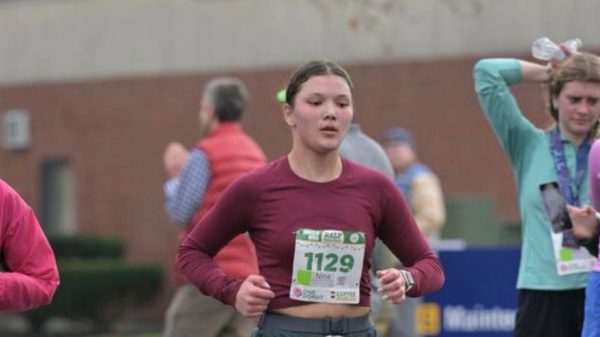Student Writers: Mary Billeter and “The Ghosts of Morgraig Castle”
Sophomore Mary Billeter is an avid writer and aspiring novelist. As the winner of the Marginal Short Story Contest, her piece titled “The Ghosts of Morgraig Castle” will feature in the school’s literary journal.
Her writing draws from specific topics she believes are relevant and meaningful, such as global warming and domestic violence.
Additionally, Billeter has always known that she was going to become a writer. Early in her childhood, she remembers reading books behind the couch and making up different scenarios—subsequently inspiring her to begin jotting them down.
Figuring out her creative outlet and sharing her work with other people was difficult. Her advice for other student writers, “When you’re writing, you’re sharing a part of your heart and soul. It doesn’t matter if it’s good. Just do it.”
“I believe I wrote this story based on a writing prompt in the middle of a sleepaway camp over the summer.”
“This was an interesting piece because a significant part of me is the importance of family history and remembering people and their individual lives. I know if I was a ghost I would want to be remembered.”
“Essentially, this short story is about a living girl who hears ghosts and wants other people to remember them too.”
The Ghosts of Morgraig Castle
The young woman stared into the castle ruins, not quite believing what she was hearing. True, she had heard the stories, rumors, and legends of the old stone castle on the grassy highlands, but she had never imagined it could be real. She had never believed it could be real.
Wind blew through her hair, pushing her towards the low stone wall.
She knew she should be worried, as a young woman alone where no one would think to look for her should she encounter trouble, but she only felt a strange sense of curiosity and calm. Something about the ruins felt right, like a rope was pulling her forwards into what had once been a beautiful castle.
The tranquil melody came again, floating on the wind to her ears. It was hauntingly beautiful, but she couldn’t see where it was coming from. No one was on the moor but her and the wind and the crumbling old stones.
It was the music that set these ruins apart from the other castles scattered across the country. It was the music that sparked the stories, the rumors, the legends. The stories claimed that the music played itself. The rumors claimed the music came from the crazy old man that lived at the edge of town – that he was secretly a musical genius who practiced near the ruins so no one would hear him. The legends claimed that years ago, a fairy had cursed the royal organist to play forever.
Regardless, the organ played, somewhere out of sight.
“Hello?” The woman called, not expecting a response. The organ player never responded to anyone. Somewhere in the ruins, the music stopped.
Silence.
She sighed. She should have known better than to think she would be able to solve the mystery of the ruins.
“Hello.”
The young woman jumped, looking around wildly for the owner of the voice that had spoken. A faint gasp came from somewhere beside her, but she couldn’t see anyone there.
“Can you… hear me?” The voice asked, no louder than a whisper.
The woman stretched out her hand, looking for someone invisible. Surely, she would at least be able to feel the person. She couldn’t have gone crazy. She had heard a voice, and voices must come from somewhere.
“Where are you?” She muttered under her breath.
“You’ll never be able to see, but I am here, I promise. I am a ghost. My life has long been forgotten by everyone, even me. I am the one who plays the Forgotten Organ, found only in the memory of this castle, Morgraig Castle. It is all I know of the world.”
“You’re a ghost? But… that’s impossible. Ghosts don’t exist.”
“Either I exist or you’re talking to yourself.”
“If you’re real… what’s your name?”
Wind rushed past the woman’s left ear, and another, deeper voice replied, “None of us remember our names. All we remember is the castle. We wish we could take care of it the way we once could. If it fades until even the stones are no more than rubble, the only thing tethering us to mortal memory will be gone.”
“Why don’t you ask the living for help?”
More wind swirled around the young woman, snickering.
“If we could, dear, we would.” The air seemed to grow melancholy as the organist replied, “They hear my music, but they don’t hear me.”
A third ghost cut in, “You are the first living being to hear our voices since the castle was destroyed long ago. You are our only chance at being remembered. Please, please help us. We want to remember who we are. We want our stories to be told.”
To any outsiders, the scene must have looked crazy. They couldn’t hear the voices of hundreds of ghosts across the moor.
But the young woman could.
The next day, she returned.
She bought the land upon which the castle had once stood. For years, the young woman returned, slowly rebuilding the castle with the help of her ghosts. As the castle returned to its former glory, so did the memories of the ghosts. Often, the young woman could be found sitting in the green grass with her eyes closed, listening to the stories they told of the people who had come and gone in the town far below.
Still, the ghosts couldn’t remember who they were.
When she came home at night, people whispered that she had gone insane. They heard her stories of ghosts on the moor and deemed her unsuitable to be around.
Still, many realized she was wise beyond her years. Children would listen to her stories with wide eyes and bright smiles until their parents pulled them away.
Her project expanded. Curious travelers from miles away came to see the reconstruction of the ancient castle. Some donated to keep the project going, especially as the castle grew closer to completion.
Though the townspeople ignored her at first, there came a time where they couldn’t stand back and watch.
“Do you want any help, miss?” One child asked, the first to approach the young woman.
“That would be very nice. Do you know what would really help? Finding records of those who used to live here. Can you do that for me?”
The child tilted his head and asked, “Why do you need that?”
She smiled and explained, “They’re my friends, and they want people to remember them. The best we can do to help them is to spread their stories.”
The child ran off and convinced all of his friends to help him learn about the old castle ruins. From that point onwards, the desire to learn about the old castle spread like wildfire through the town.
The young woman watched it with a growing smile, until, finally, the castle had been completely restored.
Not long after the castle had been completed, the young woman moved into the castle. She dressed as though she had lived in the castle before it had ever been destroyed, and used her manner of dressing to teach those around her what she had learned about the castle and its history. Everyone in the little town called her the Lady of Morgraig Castle.
School students came to the castle on field trips. They looked around with awe written on their faces. Sometimes, the Forgotten Organ serenaded the students, to their eternal delight.
The young woman was often quoted, saying, “If we forget the past, it may as well have never happened. There are lessons to learn from the past that should never be swept under the rug. There are people out there who are waiting for their stories to be told. We must remember the past.”
The young woman published all the information the town found out about the original castle, and all the stories the ghosts had told her in a beautiful, leather-bound book. The books sold in countries all over the world.
One copy, she kept for herself. She wrapped it in golden paper and carried the package through the main entrance, up the grand staircase, down a drafty corridor, and into a large hall with an organ at the end. The keys moved on their own, playing the same haunting melody that the organist had played when the young woman first heard the ghosts of the castle.
She gently placed the gold-wrapped book next to the organ and left the room, a smile tugging at her lips.
The organ stopped. Gusts of wind rushed into the room, hundreds of ghosts crowded around the glittering gift.
The organist read the tag aloud to the crowd of ghosts, “To the first ghost I ever met, the player of the Forgotten Organ, Lady Gertrude of Wales. I know your name. I hear you. You are remembered and will never again be forgotten.” (1533)






